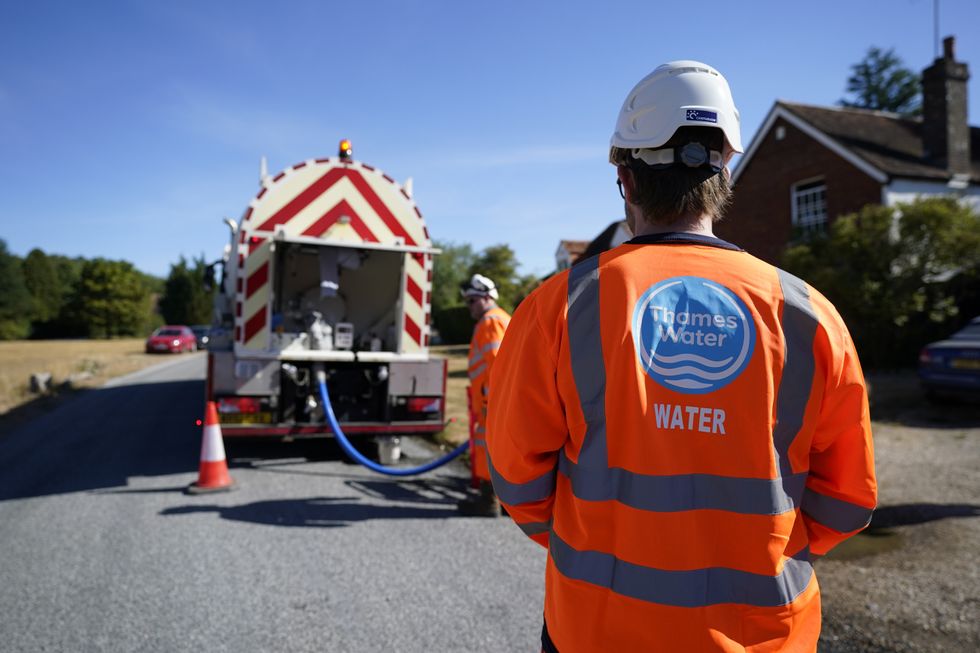Water companies in England and Wales have been ordered to pay a £157.6million penalty to customers via lower bills next year after missing key targets, Ofwat has announced.
The industry regulator’s decision follows its annual review of water and wastewater companies’ performance.
This penalty marks a significant increase from the £114million firms were required to pay back last year. The rebate is a result of companies missing crucial targets on reducing pollution, leaks, and supply interruptions.
Ofwat said customer bills will be reduced to reflect the penalties, with total rebates to be calculated in December – however, Britons may not see an actual refund.
Thames Water will have to make the largest repayment to customers of £56.8m, despite improving its overall performance from last year.
However, this is only expected to amount to a reduction of a few pounds on bills and will be dwarfed by the expected long-term increase of £94 per household over the next five years, which Ofwat is currently proposing.

Thames Water moved up a category from “lagging” to “average” as it met some performance targets on leakage and supply interruptions
PA
Ofwat chief executive David Black warned that “money alone” would not resolve the issues plaguing the water industry.
He emphasised the need for a fundamental change in company culture to address ongoing problems.
Ofwat assesses the performance of the 17 largest water and wastewater companies in England and Wales each year against key targets, for issues such as sewer flooding, supply interruptions and water leaks.
For the second year in a row, no company achieved the top rating, although four companies did show an improvement from last year.
Anglian Water, Welsh Water, and Southern Water fell into the lowest category of “lagging”.
The remaining 10 companies were rated as “average”. Thames Water, previously in the “lagging” category, improved to “average” by meeting some performance targets on leakage and supply interruptions.
Ofwat judges water companies against targets set in 2019 for a five-year period until 2025. Failure to meet these results in restrictions on the amount companies can charge customers.
The regulator noted that these figures are provisional until a review process is completed. This assessment comes amidst growing public and political anger over the privatised water sector’s performance on sewage spills and infrastructure maintenance.
Black, emphasised the need for substantial changes in the water industry. He stated: “This year’s performance report is stark evidence that money alone will not bring the sustained improvements that customers rightly expect.”
Black criticised companies for blaming external factors for their shortcomings. He urged them to be more proactive, saying: “Companies must implement actions now to improve performance, be more dynamic, agile and on the front foot of issues.”
The regulator’s stance reflects growing concerns about the sector’s ability to meet environmental and service standards. Black stressed the importance of cultural shifts within water companies.
He said: “As we look towards the next price control, the challenge for water companies is to match the investment with the changes in company culture and performance that are essential to deliver lasting change.”
These penalties are separate from an ongoing Ofwat investigation into all 11 water firms in England and Wales.
Years of under-investment by privatised firms, combined with ageing infrastructure and climate change impacts, have led to a decline in water quality across England’s rivers, lakes and oceans.
A recent Environment Agency report found that almost a fifth of water supplies are lost through leaks before reaching customers’ taps. The industry is also under scrutiny for high levels of debt, shareholder dividends and executive bonuses.
Ofwat said customer bills will be reduced to reflect the penalties, but that the total rebates will be calculated in December.
However, with bills set to rise overall in April, it remains unclear whether homeowners will see a net benefit from these rebates.